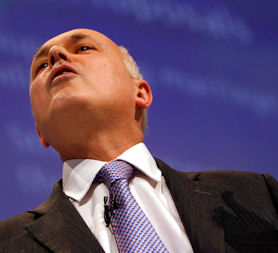Benefits reform: ‘biggest shake-up for 60 years’
The Government unveils its Welfare Bill, hailing it as the biggest reform of the benefits system since its inception. But Channel 4 News hears from people who remain worried by the changes.

The Government said its Welfare Reform Bill will “make work pay” and ensure that taxpayers respect the benefits system, while those who need support get it without feeling hopeless and trapped. The reforms will also make the system simpler, and punish those who try to cheat it, the Government said.
The bill includes sweeping reforms including the introduction of the Universal Credit, a single payment designed to replace a host of benefits, including out-of-work benefits and Tax Credits.
Work and Pensions Secretary Iain Duncan Smith said: “The welfare system was created to meet the demand for a fairer society. Today, this Bill will seek to restore the welfare system to those founding principles. Our reforms will end the absurdity of a system where people too often get rewarded for doing the wrong thing, and those who strive to do the best by their families get penalised.
Our reforms will end the absurdity of a system where people too often get rewarded for doing the wrong thing. Iain Duncan Smith
“The publication of the Welfare Reform Bill will put work, rather than hand-outs, at the heart of the welfare system. It will ensure that we continue to provide appropriate support for those genuinely unable to work, as we must and as we should. And it will provide a fair deal for the taxpayer.”
The changes will slash £5.5bn from welfare costs in the next five years, Prime Minister David Cameron said, adding that the package was “the most ambitious, fundamental and radical changes” to the system since it was created. He insisted the bill was “not an exercise in accounting – it’s about changing our culture.”
The Government also unveiled plans for a taskforce led by Dame Carol Black, the Government’s National Director for Health and Work, and David Frost, Director of the British Chamber of Commerce, to tackle Britain’s “sicknote” culture.
Reforms
The changes include the introduction of the Universal Credit, tougher sanctions for unemployed people who turn down jobs, and potential benefit caps. But controversial plans to cut housing benefit by 10 per cent for people who have been unemployed for more than a year have been dropped.
The Government also guaranteed that benefits like the Disability Living Allowance will not be means tested.

The changes include:
– The introduction of Universal Credit, replacing tens of benefits including Jobseekers’ Allowance by 2013
– Replacing Disability Living Allowance with the Personal Independence Payment, which will be assessed
– New powers to tackle fraud, which costs the Government £5.2bn annually, and tougher sanctions including “three strike” rule for the unemployed who do not seek work
– A cap, linked to average weekly earnings, which will limit the amount of benefits one household can receive
– Employment Support Allowance will be limited to 12 months’ support for those able to prepare for work
The Government has already outlined some of the controversial elements of its welfare system reform, including changing housing benefit and cutting child benefit for higher rate taxpayers.
Reaction
While many welcomed the simplification of the benefits system, groups warned that people will suffer.
TUC General Secretary Brendan Barber said: “”Making low-income working families thousands of pounds worse off through welfare cuts over the next two years to claim that they will be slightly better off in 2013 is an absurd argument that will ring hollow as families suffer the toughest income squeeze for nearly a century.”
Richard Hawkes, chief executive of Scope, said: “Many disabled people can work and want to work, but the Government is in danger of missing out on their contribution because the welfare system it is proposing isn’t sophisticated enough to realise disabled people’s potential.
“The new assessment is a blunt tool that will find many disabled people fit for work, but in the real world, faced with intense competition for few jobs, negative attitudes from employers and very limited access to specialist help, they will struggle to find employment.
Read more from Channel 4 News on the fears of disabled people over benefit reform
“We are asking Iain Duncan Smith and the Government to reconsider their approach and work with us to design a system of support that will really succeed in helping disabled people move off benefits and into stable employment.”
Laura Weir, head of policy & campaigns for the MS Society, told Channel 4 News: “Thousands of people with multiple sclerosis rely on DLA to allow them to manage the high costs of living with the condition. New face to face tests will mean further stress and unnecessary bureaucratic hurdles and there is a great danger that those with fluctuating conditions, like MS, will lose out.”
Director of Policy at Disability Alliance, Neil Coyle, told Channel 4 News: “Many disabled people and their families will not be able to access the kind of support they would have had previously. We don’t know how things like disabled premiums or carers’ premiums will work, so there could be a knock-on effect for the whole family.
“There are positives – Universal Credit could lead to simplification, and we would welcome that. But the risk is that people will lose interlinked support. A third of working age disabled adults live in poverty – and that’s before the work capability assessment potentially loses them support. Universal Credit is meant to tackle that but we have not seen how yet.”
Cindy Doyle MacRae’s daughter Lea has autism, and she told Channel 4 News the benefit changes make her feel like her daughter is “being mugged”. Watch the video below.